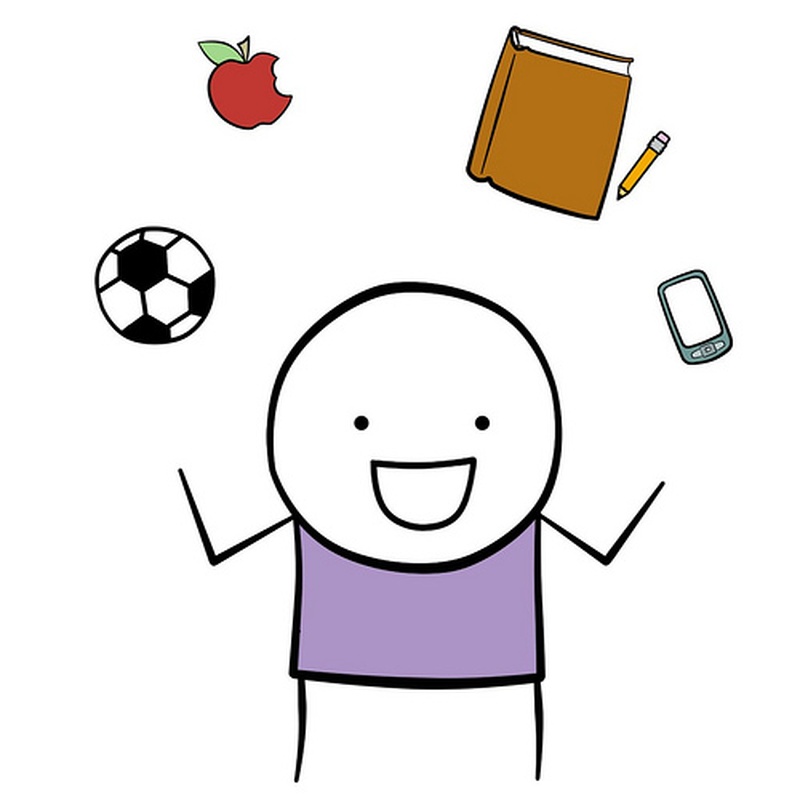Study Skills Tip for December - Time to Reflect: Steps to Success
With the end of the year fast approaching, take the time to ask yourself these questions:
- How well did I do this year at school?
- Did my particular style of thinking or approach produce more or less learning than I had expected?
- What could I have done differently?
- What might I change to help me improve next year?
Take a piece of paper and write down the top 5 changes you want to make in your approach to school next year. Do it now because you will forget what you did in the new year. That way you can review your list before you start school again next year.

UBC Learning Commons. (2013). Cartoon Juggling [Photo]. Retrieved from https://www.flickr.com/photos/56866338@N06/8725703809/
If you need a bit more help identifying what you could do to improve, work carefully through the next section. The following is adapted from the ‘Becoming a Senior Student’ unit in the Study Skills Handbook that is found in Destiny Discover, but is suitable for students at all levels.
Moving Your Results to the Next Level
Level 1: Do you have the basics under control?
It is pretty hard to get decent marks if you aren’t doing at least the three ‘E’s on Level 1:
- ENROLMENT: coming to school every day, attending every lesson.
- EQUIPMENT: coming to class with textbooks, writing paper, pens.
- ENGAGEMENT: working in the classroom, trying your best, doing what you are asked to do.
Level 2: Do you have everything set up for learning?
Got the basics under control and ready to move your results to this next level?
Then this is what you need to do next:
- COMPLETING SET HOMEWORK: Your teachers are giving you this work for a reason! To help you understand the subject better. It makes sense to put a bit of effort in to do this work.
- PARTICIPATING IN CLASS / ASKING FOR HELP: By participating it helps you understand better in class which means less work to do at home. It is also important to ask for help from your teachers if you do not understand something.
- HOME STUDY ENVIRONMENT / ORGANISING RESOURCES: It is important you can find everything you need when you need it. Consider how you have set up your workspace, how you manage all the paper and all of the digital resources you receive in the senior years.
Level 3: Do you study and manage your workload effectively?
Now that you have got things set up, time to make your life easier, and your study more effective, with the techniques on this next level.
- PREPARING FOR ASSESSMENTS: Are you?
- Using a Term Planner or Term Calendar so you can clearly see when assessments are due.
- Using a Diary to help plan for assessments - make a plan of work and keep track of what you have done.
- WORKING EFFICIENTLY AT HOME: Are you?
- Working in half hour blocks with no distractions.
- Making a study plan or study timetable.
- Making a plan each afternoon before you leave school.
- Using software such as ‘Self-Control’ and ‘Freedom’ to manage distractions.
- Separating school work and personal time.
- Allocating set times to schoolwork.
- USING THE 1,2,3 STUDY METHOD: Are you?
- Avoiding just reading your notes over and over.
- Avoiding leaving study until the last minute.
Instead, this is how you study in the senior years:
- MAKE STUDY NOTES
- LEARN THE NOTES BY TESTING YOURSELF ON THEM
- DO LOTS OF QUESTIONS TO PRACTISE YOUR SKILLS
Level 4: Do you want to get the best results you are capable of?
So you have decided to go all out and aim for great marks. Well done you! The nice thing about school is that it rewards hard work and effort, you don’t have to be a genius, you just have to get stuck into it. If you are ready to move your results to the next level, here are your next steps.
- MAKING STUDY NOTES EARLY:
Don’t wait until exam time. Make your study notes as you go, often at the end of a topic or section or every few weeks.
File away your study notes when complete so they are ready for exams.
Try advanced forms of note-making.
- USING A WIDE VARIETY OF STUDY TECHNIQUES:
The more different ways you interact with the information you are trying to learn the better chance you have of retaining this information.
Explore which study techniques are most suited to your style of learning.
- AIM FOR 2-3 HOURS OF SCHOOLWORK PER NIGHT (FOR SENIORS):
Do homework first.
Then work on assessments.
If you still have time, continue with work on study notes.
If notes are up-to-date, think what else you could do to improve your understanding of the subject, study guides, practice papers, revision books, practice essays.
Learn more about all these topics by working through the relevant units of work in the Study Skills Handbook.
The holidays are also a perfect time to stretch your brain. The best thing you can do for your brain is to try something new, this will build new neural pathways in your brain. So these holidays, try at least one thing you have never done before, Sudoku, start learning a new language, try a new sport, take up a new hobby, even brushing your teeth with the opposite hand can have a beneficial effect on the brain!
The College Library